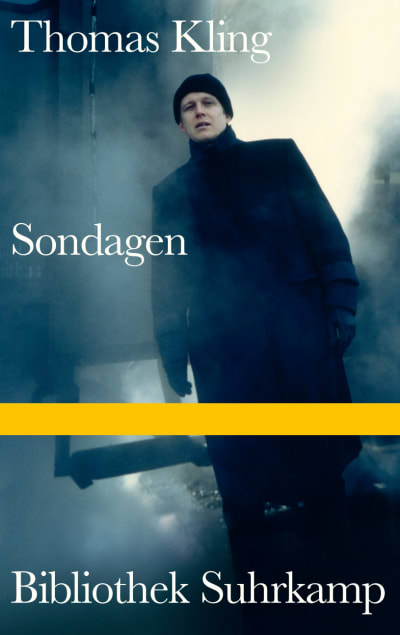France (Unès)
As the images of the devastating attack on the World Trade Center in New York were flickering across the TV screens on September 11, 2001, Thomas Kling began drafting a laconic lament as a live connection »to the waters of the hudson«: Manhattan Mundraum Zwei. The volume Sondages, published in 2002, opens with this poem, which thus arches over the cyclically structured events that followed.
With his special method, the empathetic zoom wrought from words, the poet...
As the images of the devastating attack on the World Trade Center in New York were flickering across the TV screens on September 11, 2001, Thomas Kling began drafting a laconic lament as a live connection »to the waters of the hudson«: Manhattan Mundraum Zwei. The volume Sondages, published in 2002, opens with this poem, which thus arches over the cyclically structured events that followed.
With his special method, the empathetic zoom wrought from words, the poet approaches scenes of the Spanish Civil War, undertakes a sailing voyage in the footsteps of Beowulf, descends into ancient Greece with adaptations, remembers rummaging through a villa destined for demolition in Düsseldorf. The couterpiece to »Manhattan Mundraum Zwei« is the cycle »A Hombroich-Elegy«, in which nature is transofrmed in micro-dramas of harrowing tenderness right in front of the window of his study. Sondages – the excavation of layers in the linguistic terrain.
»Even 15 years after his death Thomas Kling is ›still the fiercest‹ most eloquent poet of his generation« Michael Braun, Der Tagesspiegel
»Those who wish to discover the extraordinary poet Thomas Kling, can do so in Sondages, which present Kling's perception and his poetic transformation of [times from] the Palaeolithic Age to the Thirty Years' War and 9/11. A fantastic, exceptional work.« Matthias Ehlers, WDR
»Even 15 years after his death Thomas Kling is ›still the fiercest‹ most eloquent poet of his generation« Michael Braun, Der Tagesspiegel
»Those who wish to discover the extraordinary poet Thomas Kling, can do so in Sondages, which present Kling's perception and his poetic transformation of [times from] the Palaeolithic Age to the Thirty Years' War and 9/11. A fantastic, exceptional work.« Matthias Ehlers, WDR
Persons
Thomas Kling
Thomas Kling (1957–2005) lived in Düsseldorf, Vienna, Finland, Cologne and on the island of Hombroich, where his literary estate is now housed by the Thomas Kling Archive.
Thomas Kling (1957–2005) lived in Düsseldorf, Vienna, Finland, Cologne and on the island of Hombroich, where his literary estate is now housed by...
OTHER PUBLICATIONS

Collected Works in Four Volumes
Fifteen years after his early death, it is time to discover the entire œuvre of Thomas Kling. The provocatively-sensitive Thomas Kling of contemporary classics such as the volumes of poetry flavour enhancers and Long-distance Trading. The arbiter of traditions and fearless polemic Thomas Kling in the poetological self-placement Itinerar and in the seminal collection...

Demon Removal Service
There is a performance at the trashy theatre. Hildegard Knef gets in a car. Rudolph Moshammer carries his Yorkshire Terrier around Munich. S. T. Coleridge makes a joke about Cologne. Works of art...
Kurdish rights (tîr-verlag)

The Century that Cried itself Blind
Considering this current moment of great change as well as the 20th century when death became a master from Germany, is literature still possible? Does it still have a reason for being in a post-Auschwitz world where all cultural production can only be an expression of barbarism? Or is literature necessary, indeed indispensible, precisely because of such atrocities? Which methods must such a...

The Karnau Tapes
English World Rights (New York Review of Books), France (Ça et La), Netherlands (Scratch Books), Slovak Republic (Brak)

Putin’s Postbox
One morning, Marcel Beyer drives out to the...
English world rights (Voland & Quist)

Kaltenburg
English world rights (Harcourt), Spanish world rights (Edhasa), Chinese simplex rights (People’s Literature Publishing House), Arabic world rights (Kalima), France (Métailié), Italy (Einaudi), Netherlands (Cossée), Sweden (Bonniers), Norway (Pax), Czech Republic (Havran), Hungary (Magvetö), Croatia (Fraktura), Serbia (Geopoetika), Turkey (Ayrinti)
Domestic Rights Sales: German Audiobook (Lindhardt & Ringhof / Saga Egmont)

The Karnau Tapes
World War II. The final days of the Third Reich. Hermann Karnau, a sound engineer, is obsessively compiling an archive of every conceivable nuance of human sound. Karnau's work so impresses...
USA (Harcourt), UK (Secker and Warburg), Spanish world rights (Debate), Russia (Amphora), France (Calmann-Lévy), Italy (Einaudi), Netherlands (Meulenhoff), Denmark (Gyldendal), Sweden (Bonniers), Korea (Hyonamsa), Japan (Sanshusha), Poland (Słowo / Obraz Terytoria), Slovakia (Slovensky Spisovatel), Bulgaria (Balkani), Estonia (Tänapäev), Serbia (Geopoetika), Turkey (Ayrinti), Israel (Books in the Attic)
